Contents
- Early History
- Colonial History
- Local Figures & Organizations
- Vishwanath Kashinath Rajwade
- Karmaveer Venkatarao Tanaji Randhir
- Post-Independence Era and Contemporary Educational Infrastructure
- Primary & Secondary Education
- Institutions of Higher Learning
- Shri. Shivaji Vidya Prasarak Sanstha's Bhausaheb N.S. Patil Arts & M.F.M.A. Commerce College
- SSVPS College of Engineering
- SVKM NMIMS - Deemed to be a University
- Prominent Figures & Organizations
- Shirpur Education Society
- NGOs and Community-Based Education Efforts
- YUNG Foundation
- Graphs
- Enrollment and Dropout Rate
- A. Student Enrollment Numbers
- B. Student Enrollment (Class-Wise)
- C. Student Enrollment (Gender-Wise)
- D. Student Enrollment (By School Management Type)
- E. Drop Out Rate (By Schooling Level)
- F. Drop Out Rate (By Gender)
- Schools
- A. No. of Schools
- B. No. of Schools (Filtered by Gender Mix)
- C. No. of Schools (By School Management Type)
- Teachers
- A. No. of Teachers
- B. No. of Teachers (By School Management Type)
- C. No. of Teachers (Male vs Female)
- D. Education Level of Teachers
- Sources
DHULE
Education
Last updated on 28 July 2025. Help us improve the information on this page by clicking on suggest edits or writing to us.
The educational framework of Dhule aligns with the broader structure of the Indian education system, encompassing pre-primary, primary, secondary, and higher education. By the 19th century, the introduction of the Western education framework in the district changed its educational landscape. British administrators and missionaries became actively involved in shaping education in the region.
Still, even as colonial influences grew, the early 20th century saw a wave of local initiatives; its existence indicated an increasing public awareness regarding the importance of education. Local communities took charge of education, a movement that carried into the post-independence era, shaping the district’s educational landscape in lasting ways.
Early History
The Khandesh Gazetteer (1880) notes that prior to the establishment of government schools, nearly every large village in the region had a private school run by a Brahman. In that era, large villages typically had private schools run by Brahman teachers, often held in the teacher's home or rented spaces. Compensation for these educators was mainly in the form of grain, with occasional monetary payments, and the curriculum focused on subjects like Modi script and arithmetic.
However, with the introduction of British rule, these private institutions began to decline, struggling to compete with the newly established government schools. By 1875, the number of such private schools had significantly decreased. To support these schools, three received small grants from local funds as encouragement.
Colonial History
By the 19th century, the introduction of the Western education framework brought significant changes to the district, as British administrators and missionaries became actively involved in shaping its educational landscape.
During the British era, Dhule was part of Khandesh and served as the headquarters of the united Khandesh district. This strategic position facilitated the establishment of numerous educational institutions in the area. However, compared to other districts in the state, Dhule had a relatively lower number of educational facilities.
According to the Khandesh Gazetteer (1880), the first government school was opened in Dhule in 1826. By 1853, English medium education became available in the city. The Dhulia Training School was established in 1875 but was closed by the end of February 1877. The situation for girls' education also saw progress, with the first girls' school opening in Dhule in 1864. Despite the slower growth in the establishment of educational institutions, these early efforts laid the foundation for future educational development in the district.
Local Figures & Organizations
While entities from the West played a significant role in shaping the educational landscape of Dhule, local figures and organizations also emerged as key contributors. These institutions, founded by Indian leaders and reformers, continue to shape education in the district today.
Vishwanath Kashinath Rajwade
Vishwanath Kashinath Rajwade was a historian renowned for his contributions to the history of the Maratha Empire. Influenced by prominent history scholars like R. G. Bhandarkar, he dedicated much of his life to pioneering research by visiting villages and collecting essential documents and artifacts, particularly those related to family histories. In 1895, he launched a monthly publication called ‘Bhashantar’ (Translation), where he introduced the works of Western philosophers such as Plato, Aristotle, and Edward Gibbon, alongside Indian scholars like Shankaracharya. Through this, he sought to educate the Marathi-speaking public on topics like the history of the Marathas, the origins of Marathi and Sanskrit literature, and more.
In 1910, Rajwade established the Bharat Itihas Sanshodhak Mandal in Pune, entrusting it with his extensive collection of research materials. Following his death in 1926, the Rajwade Sanshodhak Mandal was founded in Dhule to house the works he had gathered later in his life.
Karmaveer Venkatarao Tanaji Randhir
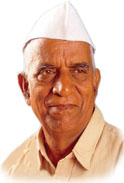
Karmaveer Venkatarao Tanaji Randhir, commonly known as Annababa, was a freedom fighter and reformer born to Tanaji and Banumai Randhir in Shingave village. His family initially resided in Rudawali before moving to Boradi village when Annababa was four years old. The Randhir family sustained themselves through the traditional parait (handicraft) business.
Annababa's early childhood was marked by illness, which his mother, Banumai, addressed with unwavering care. Although she was illiterate, Banumai understood the vital role of education and was determined to ensure that her children, including Annababa, received a proper education. Her self-respect and commitment to helping others, especially needy women, profoundly influenced Annababa’s values.

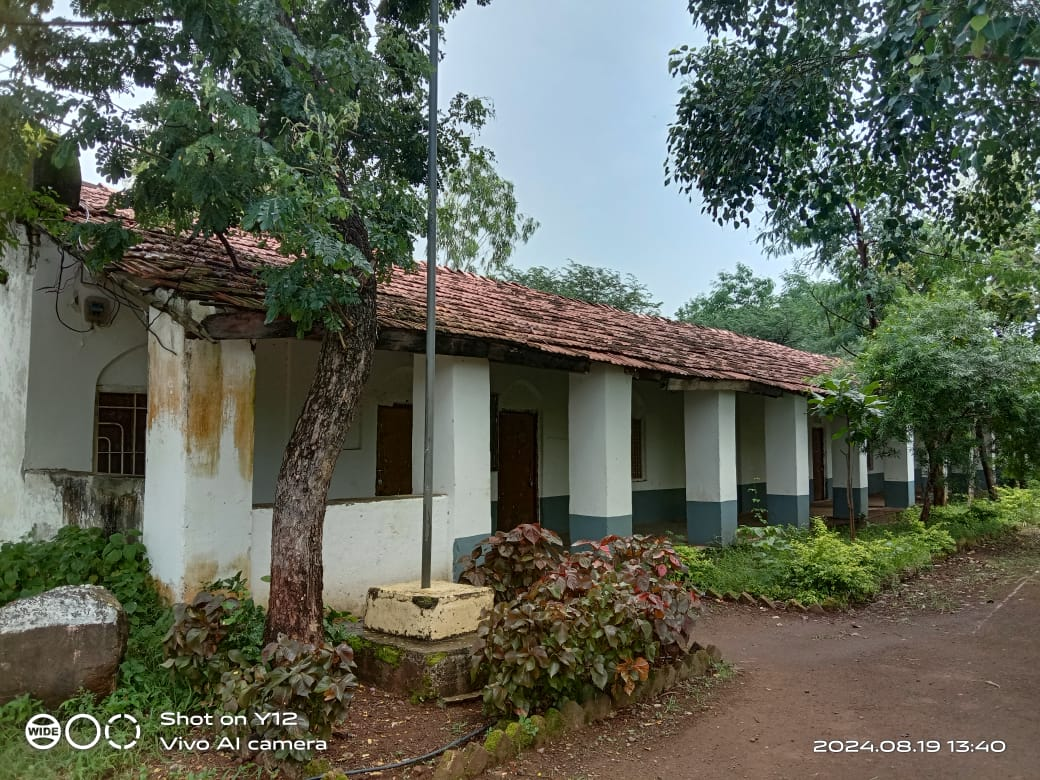
In 1941, Annababa formed the Kisan Vidya Prasarak Society (KVPS) with the vision of promoting social transformation through education. Randhir emphasized the importance of community service, equating it to social work aimed at uplifting local populations. His core message, "To Leave One from Occupation or Negligence," underscores the society's commitment to improving educational access and quality. In 1978, KVPS made significant advancements in developing research and academic programs specifically for the field of Pharmacy.
In 1972, the Kisan Vidya Prasarak Sanstha established an Ayurveda College in Boradi, playing a vital role in promoting and revitalizing traditional medicine and education in the district. Locals note that the college has attracted students from diverse regions, including Jammu and Kashmir, who are eager to pursue their studies in Ayurveda.
Post-Independence Era and Contemporary Educational Infrastructure
Following India's independence, the education system in the district underwent major transformations, driven by both state policies and local leadership. The introduction of structured education levels: pre-primary, primary, secondary, and higher education, along with the implementation of National Education Policies, heavily shaped Dhule’s educational landscape. Over the years, the sector expanded with contributions from both government-funded institutions and private organizations. Additionally, the introduction of various educational boards, each offering distinct curricula and standards, provided students with more choices and opportunities.
Primary & Secondary Education
During the colonial period, both public and private efforts in education primarily focused on primary and secondary schooling, as indicated by data from district gazetteers across Maharashtra. Higher education remained underdeveloped in most districts, including Dhule, with gradual improvements over time. While basic infrastructure for primary and secondary education existed, its expansion was closely tied to increasing enrollment and greater involvement of local figures.
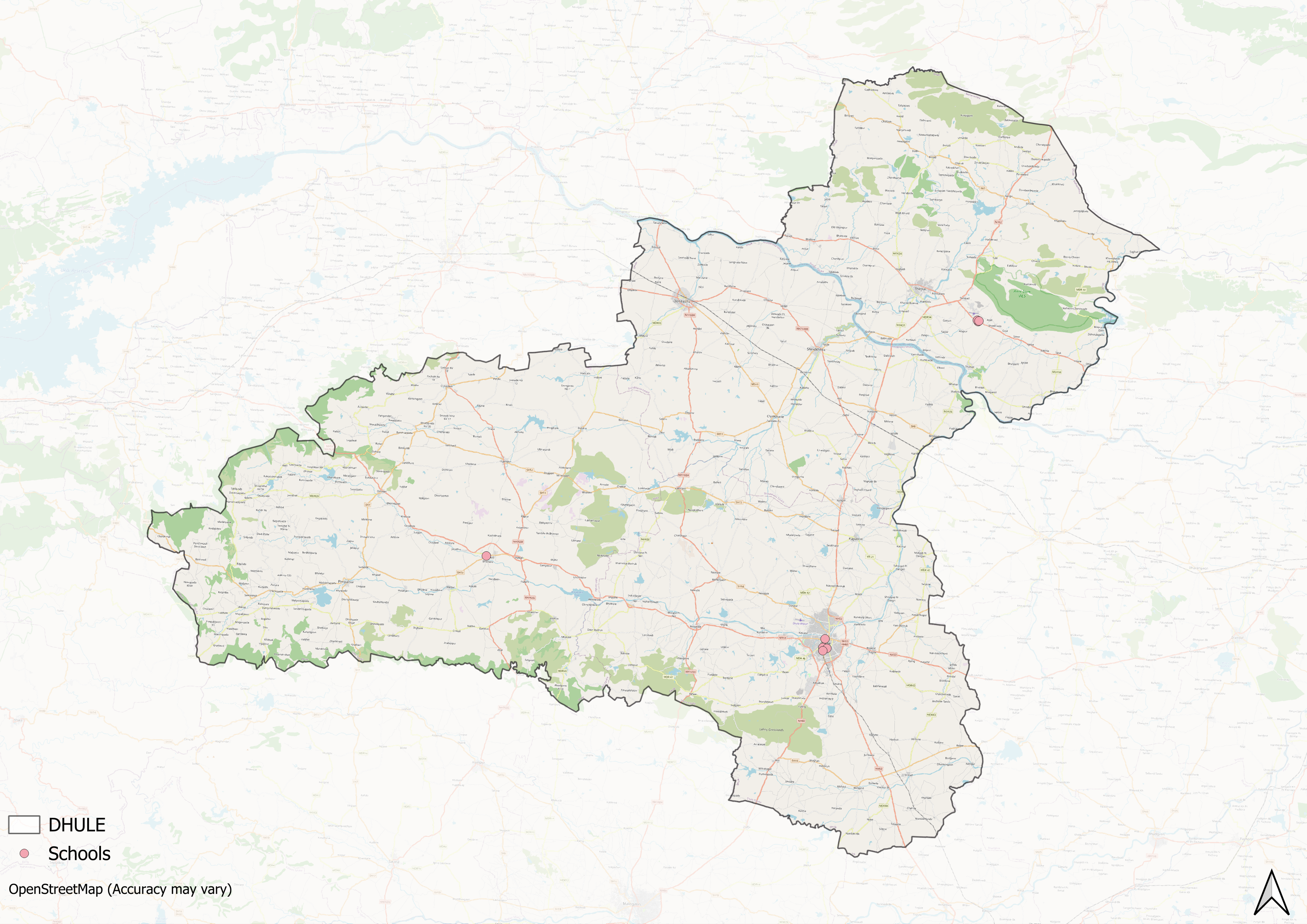
Today, this expansion is evident in the widespread presence of schools across various wards of Dhule, with available data reflecting the steady growth of educational institutions in both urban and rural parts of the district.
Institutions of Higher Learning
Perhaps one of the most notable changes in Dhule’s educational landscape is tied to the establishment of higher education institutions. While primary and secondary schooling expanded steadily, opportunities for advanced education remained limited for much of the district’s history. Over time, local leaders and organizations played a crucial role in addressing this gap, leading to the creation of several colleges. As a result, many institutions in the district today are privately managed, semi-private, or autonomous.
Shri. Shivaji Vidya Prasarak Sanstha's Bhausaheb N.S. Patil Arts & M.F.M.A. Commerce College
The S.S.V.P. Sanstha, established in 1912, was the first of its kind in the Khandesh region, created by a dedicated group committed to providing accessible education to underprivileged communities. In 1956, the Sanstha founded the Shri Shivaji Vidya Prasarak Sanstha’s Bhausaheb N.S. Patil Arts and Mulla Fidaali Mulla Abadulali Commerce College, one of the earliest institutions offering an Arts faculty in the region. Today, the college offers undergraduate programs in Arts, Commerce, Mass Media, and Journalism.
SSVPS College of Engineering
In response to the demands of industrialization and the need to keep pace with global technological advancements, the Shri Shivaji Vidya Prasarak Sanstha, a century-old organization, established an Engineering College and Polytechnic in 1983. This initiative expanded its educational offerings to include both undergraduate and postgraduate programs in Management and Engineering, thereby addressing the evolving needs of students and the industry in the region.
SVKM NMIMS - Deemed to be a University
Founded by the Shri Vile Parle Kelavani Mandal (SVKM), NMIMS has transformed over four decades from a management institute into a Deemed to be University, as recognized by UGC norms in 2003. In 2007, the university took a significant step in fulfilling its social responsibilities by opening its first off-campus facility in Shirpur, Dhule district.
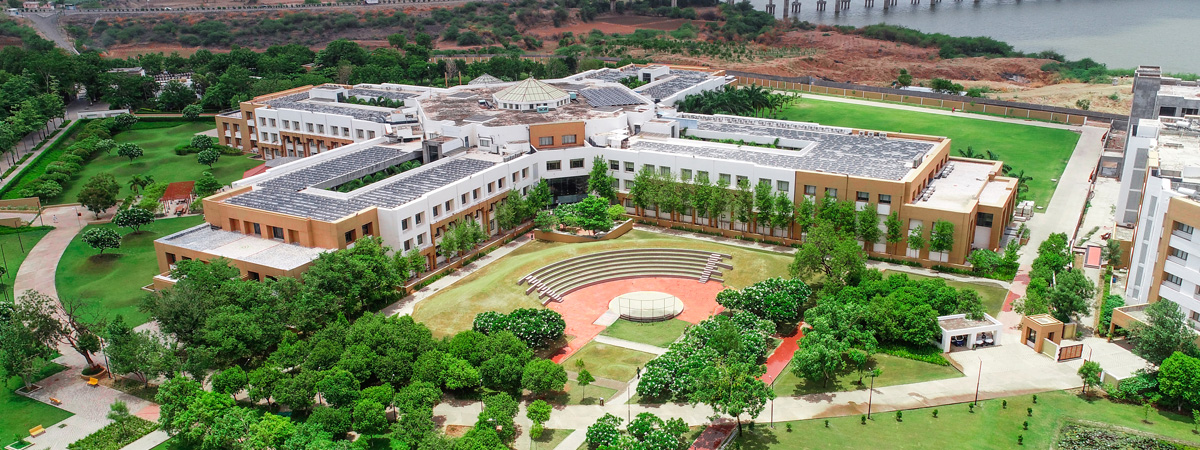
The establishment of NMIMS has significantly broadened the educational offerings within the district. The Shirpur Campus features the Mukesh Patel Technology Park, a contemporary, fully residential facility. Additionally, the Dhule campus offers Bachelor's programs in Finance, Accounting, and Corporate Law.
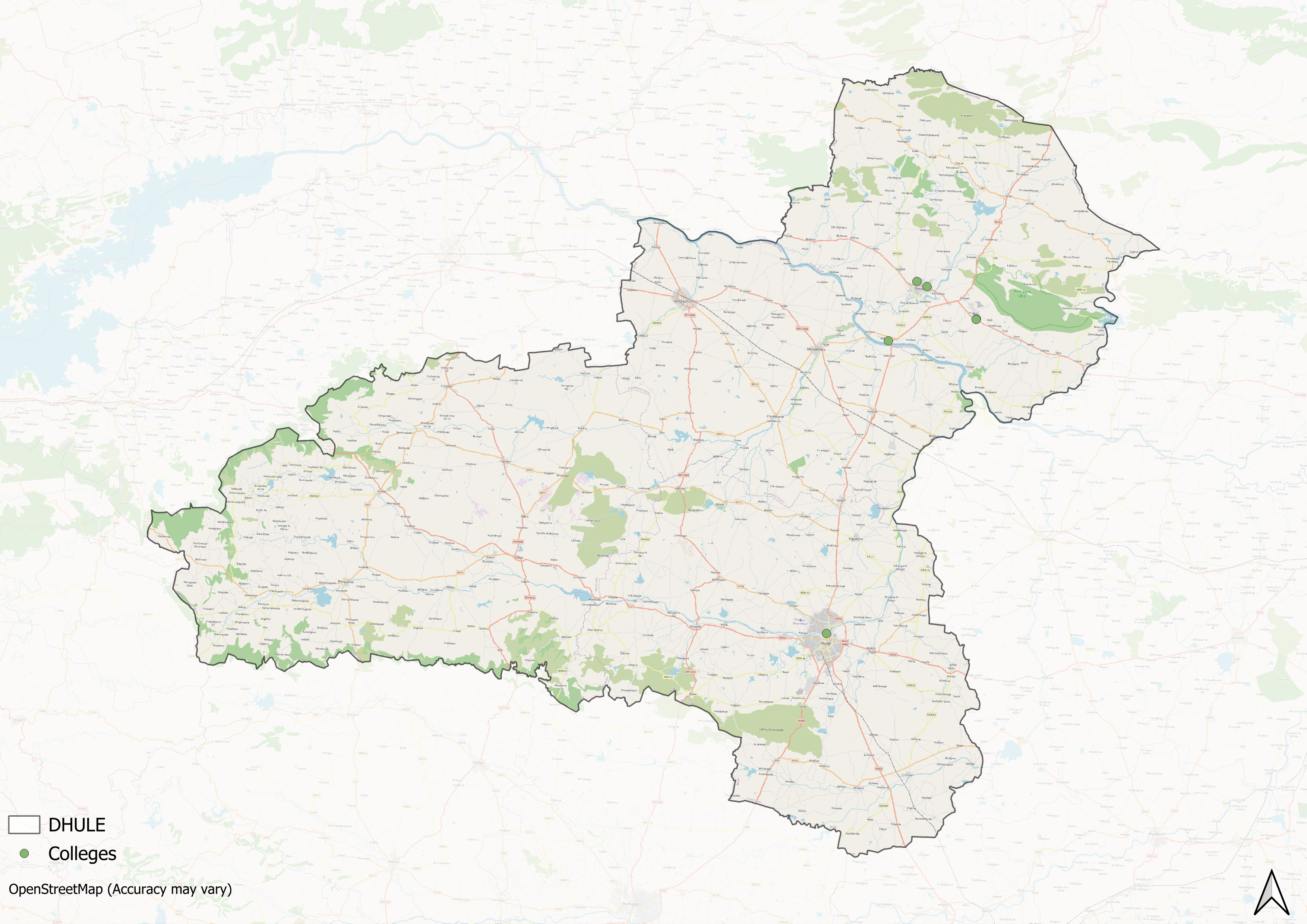
In addition to these institutions, a number of centres for higher education operate throughout the district, which offer programmes across various disciplines. While the landscape of higher education has broadened significantly since independence, disparities in access, particularly along geographic lines, remain evident.
Prominent Figures & Organizations
Shirpur Education Society
The Shirpur Education Society (SES) was established on 27 October 1979. The society has earned accolades for its outstanding efforts in enhancing educational opportunities, notably receiving a state award from the Education Minister of Maharashtra in 2003 for its significant contributions to social and educational progress.
SES provides a comprehensive range of educational services, including primary, pre-primary, high school, and higher secondary education. In addition to these foundational programs, the society is committed to advancing technical education through its Pharmacy, Engineering, and Polytechnic Colleges, as well as various other institutes.
NGOs and Community-Based Education Efforts
Education has been a key driver of social reform, particularly in addressing inequality and expanding access to learning. While formal institutions provide structured education, many communities continue to face barriers due to poverty, social stigma, or lack of resources. To address these challenges, various organizations in Dhule have focused on community-based education initiatives, with each working to tackle specific social challenges present in the district.
YUNG Foundation
During the COVID-19 pandemic, when school closures disrupted education across the country, the impact was especially severe in isolated regions with few alternatives. In Gurhadpani village, located in the hilly interior of Shirpur taluka, the YUNG Foundation, an organisation led by local youth, established a bamboo school to support students left without access to formal education.
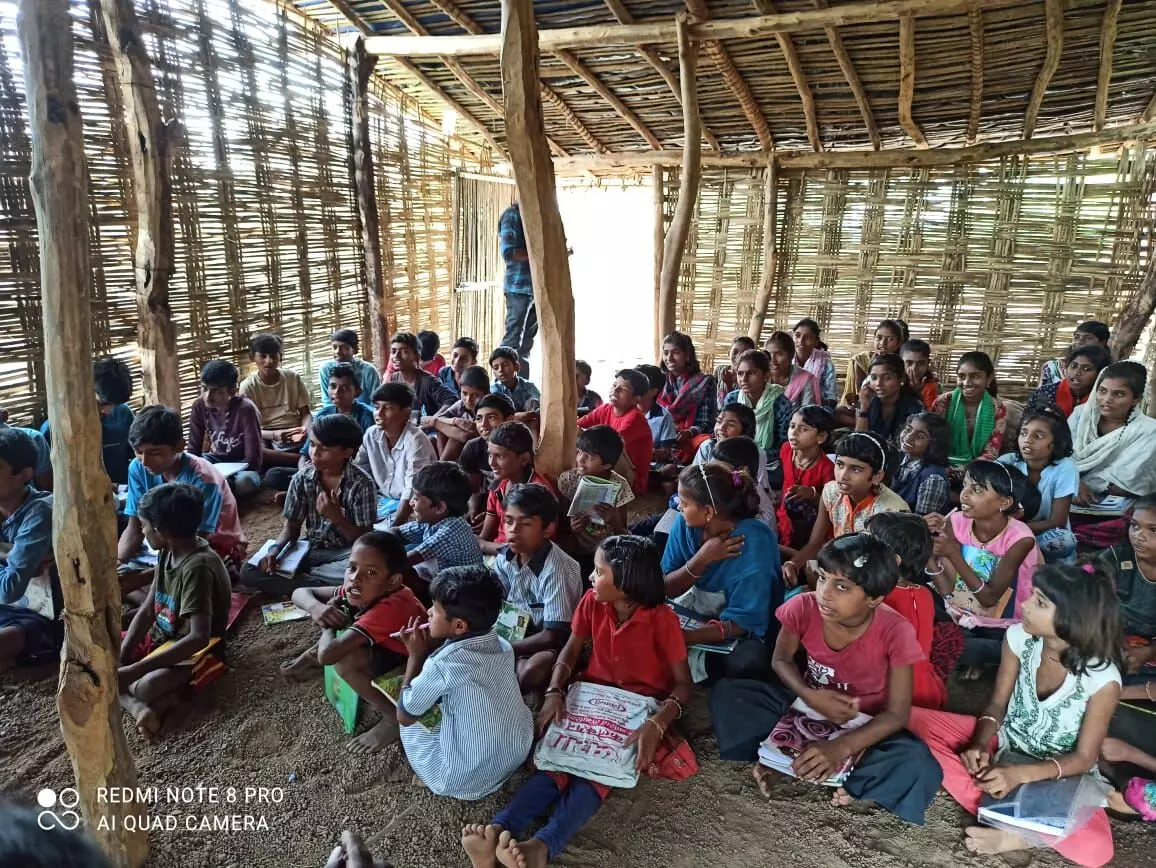
The school served children at various levels, from those preparing for exams to younger students affected by the closure of Zilla Parishad schools. By providing a consistent learning environment, the initiative helped ensure that students could continue their education despite the difficult circumstances.
Graphs
Enrollment and Dropout Rate
Schools
Teachers
Sources
Government of Maharashtra. 1974. Maharashtra state Gazetteers: Dhulia District. Bombay, Gazetteers Department.https://archive.org/details/dli.ministry.084…
James M Campbell. 1880. Gazetteer Of Bombay Presidency: Khandesh, Vol.12. Government Central Press, Bombay.https://archive.org/details/1880GazetteerOfB…
Jyotsna Kamat. 2008. Viswanath Kashinath Rajwade. Amma’s Column. www.kamat.com/jyotsna/blog/blog.php?BlogID=1181https://www.kamat.com/jyotsna/blog/blog.php?…
KVP's Institute of Pharmacy, Boradi. "About KVP’s." kvpsipeboradi.co.in/about-kvpshttps://kvpsipeboradi.co.in/about-kvps/
KVP's Institute of Pharmacy, Boradi. Information Brochure. kvpsipeboradi.co.in/wp-content/uploads/Information-Brochure.pdfhttps://kvpsipeboradi.co.in/wp-content/uploa…
Mukesh Patel School of Technology Management & Engineering. "Director's Message." engineering-shirpur.nmims.edu/about-mpstme/director-message/https://engineering-shirpur.nmims.edu/about-…
NMIMS University. "Dhule Campus." www.nmims.edu/dhulecampushttps://www.nmims.edu/dhulecampus
NMIMS University. "Shirpur Campus." www.nmims.edu/shirpurcampushttps://www.nmims.edu/shirpurcampus
Shirpur. "Official Website." www.shirpur.org/https://www.shirpur.org/
Shubham Patil. 2021. "NGO Builds a Bamboo School for Tribal Students Struggling for Education in Dhule District." Max Maharashtra. www.maxmaharashtra.com/max-reports/ngo-build-a-bamboo-school-for-tribal-students-who-are-struggling-for-education-in-dhule-district-1060539https://www.maxmaharashtra.com/max-reports/n…
SSVPS Arts & Commerce College. "About Us." svpacdhule.ac.in/https://ssvpacdhule.ac.in/
SSVPS Engineering College. "About Us." www.ssvpsengg.ac.in/https://www.ssvpsengg.ac.in/
Yung Foundation. Facebook Page. www.facebook.com/p/Yung-Foundation-100064705057637/?_rdrhttps://www.facebook.com/p/Yung-Foundation-1…
Last updated on 28 July 2025. Help us improve the information on this page by clicking on suggest edits or writing to us.